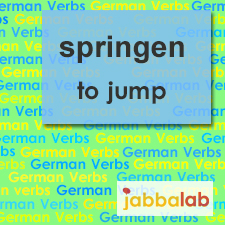Mixed German Verbs Here is a list of mixed German verbs. They combine elements of Weak Verbs and Strong Verbs. Unlike strong verbs, mixed verbs have no vowel or consonant change in their stem in the present tense. For example: Strong verb: geben ⇨ Er gibt mir einen Kuss. Mixed verb: kennen ⇨ Er kennt […]
Read the Full Blog Post



















